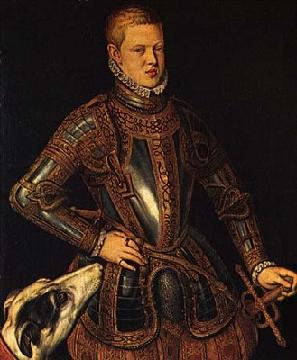 |
Iberian Union |
The
impetus provided by the Discoveries was, however, slowed down by two
factors which many historians see as the beginning of the decline of
the Portuguese Empire: the establishment of the Inquisition in Portugal
and the royal crisis which followed the death of the young King D.
Sebastião at the battle of Alcácer Quibir in the North of Africa.
With
the Inquisition, established in Portugal in 1536, the King lost the
greater part of his intellectuals, scientists, physicists,
cartographers and businessmen, most being Jewish or «new Christians»,
who were persecuted, arrested, condemned, put to death or obliged to
flee for fear of being accused of heresy by the Court of the Holy
Office. Land of pioneering and visionary people, the kingdom of
Portugal became a hostage to fear and the Inquisition, and let itself
slowly die.
To make the situation worse, Portugal was left
without an heir to the throne after the death of King D. Sebastião and
the King of Spain, invoking his right to succession - he was the
grandson of D. Manuel I of Portugal - ascended to the throne and
managed to achieve the much desired Iberian Union for the first and
only time.
With Philip II as King, Portugal saw itself
involved in a war with the traditional enemies of Spain, such as
England and the Low Countries, and its active participation resulted in
fact in the first world war, with military operations in Oceania, the
Indias, the Americas and Europe. Portugal lost a great part of its
naval fleet and countless ports and routes in what would later become
Indonesia, as well as the adjacent seas - some of these communities
still retain unequivocal traces of the Portuguese presence - but still
managed to defeat the Dutch ambitions in Africa and South America.
In
1640 Portugal regained its independence from the crown of Spain, in a
revolt against what had started as merely a royal union and had ended
up as a veritable foreign occupation, and kept up a long military and
diplomatic fight to ensure and limit the losses of its empire.
At
the start of the 18th century, the Indian maritime empire, coping with
the Dutch and English expansion and with a lack of might - moved into
the defence of mainland Portugal and the Atlantic - gently sank, which
started the Brazilian cycle.
Despite all its reverses, Portugal
continued to be one of the six great European powers and one of the
four great powers at a world level. The products coming from Africa,
India and Brazil continued to fill the royal coffers and Lisbon was one
of the richest, most monumental and extravagant cities in Europe. D.
João V, absolute King, ordered the construction of a palace in Mafra, a
basilica and a convent which, as a whole, would constitute the largest
Baroque work in Portugal. In Lisbon, the enormous Aqueduct das Águas
Livres was built, which brought water to the centre of the city, and at
the time was considered as one of the greatest works of engineering in
Europe.
 The Discoveries The Discoveries |
When the Earth Shook... 
|

